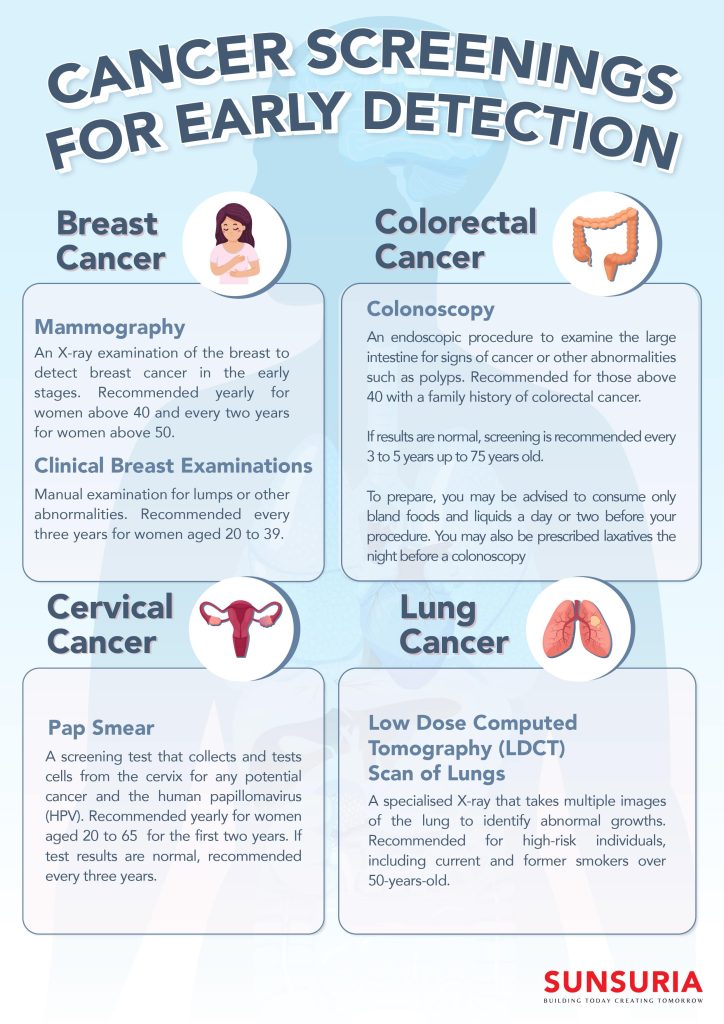KUALA LUMPUR, Jan 8 – Malaysia is in the midst of a daunting battle against a rise in cancer cases, significantly impacting the nation’s health.
According to the Ministry of Health (MOH), one in 10 men and one in nine women risk receiving a cancer diagnosis in their lifetime. Shockingly, over 63 per cent of diagnoses occur when cancer has already advanced to late stages, severely limiting treatment options and driving up health care costs.
The reasons behind these late-stage diagnoses are multifaceted. Contributing factors include a lack of awareness over cancer symptoms, a general reluctance to seek early medical intervention, and the prevalence of myths about the disease.
However, identifying the early warning signs of cancer is crucial. While the diverse array of cancer types makes pinpointing specific symptoms challenging, general early warning signs include unexplained weight loss, persistent fatigue, chronic pain, skin changes, and alterations in bowel or bladder habits.
These symptoms should serve as a clear call to action, urging individuals to seek immediate medical evaluation.
Empowering Your Health: Vital Strategies For Early Cancer Detection
The most common cancers in Malaysia are breast cancer, colorectal cancer, lung cancer, nasopharyngeal cancer, and liver cancer — taken together, these represent over half of all cancer cases diagnosed in the country.
As cancer can develop silently, progressing unnoticed until advanced stages, regular health screenings are essential for early detection of the disease. Here are some of the common screening methods available, based on cancer types:

Strengthening Malaysia’s Cancer Care Landscape: A Vision For Comprehensive And Accessible Treatment
Cancer treatment often involves a multidisciplinary approach, requiring seamless collaboration between various health care professionals, including oncologists, surgeons, radiologists, and nurses.
However, the uneven distribution of health care facilities, especially in rural areas, can hinder accessibility and pose financial and physical strains on patients.
Icon Sunsuria, a joint venture between Icon Cancer Centre and Sunsuria Healthcare, aims to bridge these gaps by providing comprehensive cancer care in Malaysia.
“This vision is grounded in a patient-centric approach that leverages partnerships between health care providers — with the end goal of creating a health care ecosystem that ensures that every Malaysian has access to best-in-class cancer care,” said Audrey Ooi, chief executive officer of Sunsuria Healthcare.
Grounding this vision is Icon Sunsuria’s recent partnership with Island Hospital. The alliance is poised to enhance access to quality care by offering cutting-edge treatments, as well as comprehensive and coordinated care from a multidisciplinary team of experts.
“In our mission to empower more cancer patients and their families, we hope to establish more cancer centres across Malaysia in the next five to seven years,” added Ooi.
Icon Sunsuria incorporates evidence-based medical breakthroughs to introduce innovative therapeutic approaches extending beyond conventional chemotherapy and radiation.
These include targeted cancer therapies, focusing on specific cancer cells with precision, disrupting cancer growth while sparing healthy cells.
Immunotherapy, delivered through injections, infusions, or direct methods, harnesses the body’s immune system, either strengthening it or targeting cancer cells directly. This diverse treatment includes cancer vaccines, monoclonal antibodies, checkpoint inhibitors, and CAR T-cell therapy.[19]
In addition to these advancements, the center has invested in improving chemotherapy and radiation techniques, featuring enhanced delivery methods.
For instance, the HyperArc, an innovative software seamlessly integrated with the Varian TrueBeam linear accelerator, precisely targets multiple brain tumours, minimising radiation exposure to healthy tissue and reducing side effects associated with conventional brain radiation, such as headaches and hair loss.
Compassionate Connections: Finding Support During The Cancer Journey In Malaysia
A cancer diagnosis is life-altering, impacting patients and their families physically, emotionally, and financially. As such, support networks and resources are crucial in helping those facing cancer navigate these challenges.
In Malaysia, assistance is available from various sources:
- Social Security Organisation (PERKESO): Provides financial relief for cancer patients unable to work. This assistance can serve to alleviate some of the financial burdens that cancer can bring, allowing patients to focus on recovery.
- Malaysian Cancer Council (MAKNA): Offers financial aid, focusing on underprivileged patients and supporting cancer awareness and research.
- National Cancer Society Malaysia (NCSM): Provides psychosocial services like counselling, nutrition advice, and peer groups for emotional support.
As Malaysians come together to confront the increasing burden of cancer, the goal is clear: to ensure that no one has to face this battle alone.
By bridging the knowledge gaps, encouraging early detection, and nurturing a community of support and awareness, the nation can make significant strides in the fight against cancer.
“With a collective effort — including everyone from policy makers to health care providers to non-profit organisations — we can reduce the impact of cancer on individuals and give them solace throughout their cancer journey.
“By arming more people with knowledge and dispelling myths and fears, we can make a significant impact in the fight against cancer,” Ooi concluded.








